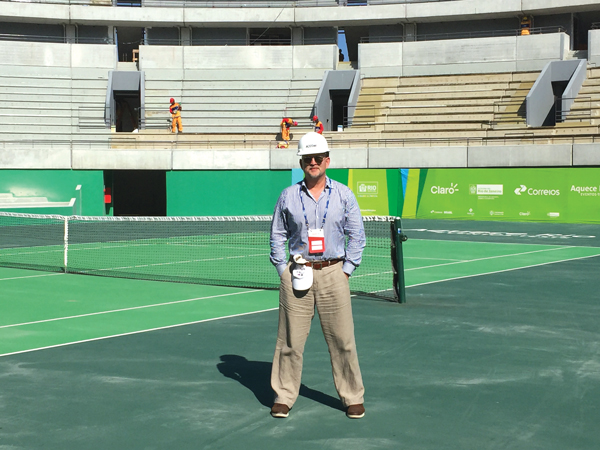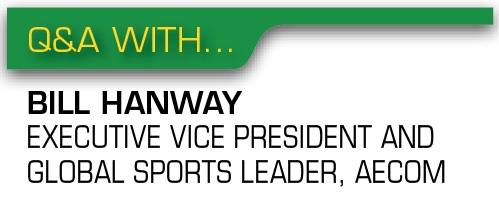Bill Hanway is the executive vice president and global sports leader at AECOM. The engineering firm, which was behind London’s Olympic master plan in 2012, has taken its experience to Brazil to help deliver the country’s upcoming Rio Olympics. Hanway spoke with SBD Global’s Anna Hrushka about improving Rio’s infrastructure, legacy planning and the economic and cultural factors that are taken into account during the Olympic bid process.
On the differences between London 2012 and Rio 2016 …
HANWAY: I think one of the key differences of how we ended up working on Rio was that we worked for nine years on London. We’re starting the L.A. ’24 bid at the same period of time, so we’ll have nine years to work on that. But in Rio, we didn’t actually win the competition until July 2011 and we didn’t get the commission to do the work until really the end of 2011 or January 2012. So we had a very accelerated schedule to do the work. That requires some different approaches to the solution.
On economic and cultural contexts …
HANWAY: You have to look at the economic context of each of the conditions and the years in which the Games were won. London was in 2003 a global economy, carrying on its strong tradition of growth and success, but then is hit in 2008 with the global financial meltdown, where a different approach had to be undertaken to complete some of the projects. Where there were some public/private projects planned out for the London Games, the outcome was that the private sector funding was not available and the public sector had to step in. … When we plan Games that span over seven to nine years, we always build in economic cycles and are aware of economic cycles. But you can’t make plans for something as drastic as 2008. … You then turn to Brazil and Rio, where they won the Games on the back of a booming economy where they were about to overtake the U.K. in terms of the GDP table, they were looking at nothing but optimism in the future, and even when we won the Games, there was an incredibly strong economy and a very stable political climate. … Then of course the economy completely crashed, there were corruption scandals, the president gets impeached, the whole foundation of the economics changes. Now, in that context, we still have to hold the Games.
On Olympic innovations …
 |
AECOM’s Bill Hanway stands on center court at the tennis venue for the Rio Games.
Photo by: AECOM |
HANWAY: I think it’s interesting that although Agenda 2020 wasn’t part of the planning process for Rio, the premises and concepts and the transformation of the [International Olympic Committee] was already taking place. There was an understanding that the historic model needed to evolve from one where it’s dominated by meeting every sporting federation’s requirements all the time and to the maximum requirement, which without question has caused some of the challenges that we’ve seen in previous Olympics where you have venues that are no longer in use or are built to a capacity that is not relevant to even world championships in terms of size and scale. That produces capital costs that are very high versus what the outcome could be. I think [there was] the awareness that venues had to change and the approach to venues had to change. I know that you’ve already written about the temporary venues — but that evolution was one of the critical stages of change that occurred. … So in terms of the [Rio] handball arena, that is going to be taken apart and be able to be delivered for four primary schools. That concept was established very firmly by the mayor who was looking at, how do you take the advantages inherent in hosting the Games and the capital funding that will flow from that decision and how do you channel it into a legacy that is not just won on paper, but actually delivers in the short term and long term. I think that has evolved and provided innovative thinking in terms of the overall process.
On the evolution of Olympic facilities …
HANWAY: I think you’ll see two things evolving. We have the privilege of having worked on Tokyo for the past couple of years already. The initial stages, we’ve been working already with the Los Angeles 2024 bid for the past two years, and I think those two cities are fully embracing Agenda 2020 and the approach. So it’s not just about what the use of temporary venues are, but then also how you can take greater advantage of your existing facilities, how can you lower the cost overall of staging the Games and how you can reduce the sort of unsustainability footprint by that process. That makes its way almost all the way to Los Angeles where we’re now looking at a plan where 97 percent of the venues are either existing or temporary and if we continue down that path, I think you’ll see cities bidding where you’re almost entirely using existing venues or temporary ones in order to host those events at the Games, but also to adjust economically to the pressures of hosting these Games.
The following are results of the Turnkey Sports Poll taken in July. The survey covered more than 2,000 senior-level sports industry executives spanning professional and college sports.
Which of the following sports are you least excited about watching in the upcoming Olympics?
The IOC/respective sports' governing bodies allow professional athletes in some sports (e.g., basketball, hockey, tennis, golf) to participate in the Olympics while restricting professional athletes in others (e.g., boxing). Should all athletes be allowed to participate in the Olympics, regardless of their amateur/professional status?
| Yes |
72% |
| No |
27% |
| Not sure / No response |
1% |
If it was your call to determine how NBC broadcasts top events in the Olympics, would you …?
| Show events live whenever they happen and then re-run them in prime time |
84% |
| Only show events live |
10% |
| Only show events in prime time, even if that meant using tape delay |
4% |
| Not sure / No response |
2% |
Source: Turnkey Sports & Entertainment in conjunction with SportsBusiness Journal. Turnkey Intelligence specializes in research, measurement and lead generation for brands and properties. Visit www.turnkeyse.com.
On temporary construction …
HANWAY: Modular construction is advancing at a rapid rate. Whether they’re steel-plated seating bowls that could be removed and reused, whether it’s steel structures that are from steel sections that can be reused and external materials that can be adapted and reconstructed for other uses … the list goes on and on in terms of the evolution of those elements. Now, I know that there are economists that look at that whole package and say, you can possibly deliver a new school at a cheaper rate than reusing the temporary venues, but you have to put into play the cost of the land, the cost of assembly, the sustainability impact of getting rid of the material that’s used for temporary venues. So when you balance things out, there’s a real benefit to looking at how you can translate sporting venues into other uses.
On his outlook for Rio 2016 …
HANWAY: We all know that there’s been a huge amount of negative publicity around the Games. Every major sports federation is challenged at a number of different levels. I still am very optimistic that the Rio Games are going to be a success. I’m personally going to be there for all 21 days of the Games and I certainly look forward to every single aspect of that. As much as there are challenges right now, I also think that Rio and the cariocas can throw a great party and it will be a great celebration. I think that that is certainly part of it. The whole positive nature of great athletes performing amazing sporting feats, many of whom have overcome challenges in their lifetime to achieve their goals, is still one of the greatest spectacles and is one of the reasons why I so love my job.






